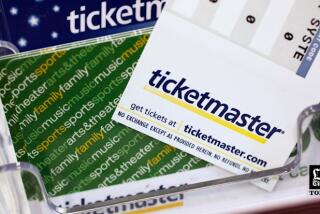U.S. Offers Rules for Informing Ticketless Fliers of Rights
- Share via
WASHINGTON — The U.S. Department of Transportation thinks it’s essential that airline passengers have a ticket to ride--and it’s all right if it’s an electronic one.
But the department wants to be sure that “ticketless travel” passengers are told of their rights and the airlines’ liabilities when it comes to lost baggage, overbooked flights, refunds and other issues. Holders of paper tickets find their rights spelled out on the inside of ticket “jackets” or on the ticket itself.
Last week, DOT spelled out a variety of ways that airlines could convey this information to passengers who make electronic arrangements for travel and may receive only a confirmation number for a flight rather than a traditional paper ticket.
Instead of having to mail the information after an electronic transaction, airlines may provide it at the gate, mention it in a phone conversation with customers, put it on a World Wide Web site or occasionally mail it to frequent fliers.
An earlier DOT proposal would have had consumers notified of their rights “within a few days after the purchase transaction.” DOT’s final word says passengers need to be informed “no later than the time that they check in at the airport for the first flight in their itinerary”--a flexibility the airlines had sought.
What swayed DOT, a department official who worked on the notice said, were the competitive implications of the rule.
Major airlines routinely mail or fax confirmations, itineraries and customer information because they already have staffing levels to handle the paperwork.
New lower-cost entrants, such as ValuJet Airlines Inc., never routinely give notice through the mail. Instead, ValuJet recites an 11-point script and then follows up with information on baggage liability and other contractual terms at the gate.
ValuJet told DOT that the cost of providing written notice in every case would be “staggering”--about $1 million annually.
Southwest Airlines Co., which tickets 40% of its passengers electronically, said it mails or faxes notices but may want to change that practice as technology continues to develop.
US Airways Inc. has electronic ticketing and an online booking service for about 70,000 of its most frequent fliers. The carrier still mails boarding passes with the information on the back but says that in the future it may not.
Consumer advocates worry that waiting until there is a rush at the gate won’t allow passengers to be fully informed.
“We advocate they give the consumer the information at the time of confirmation. Notice at the counter is not sufficient,” said Robert DiVito, executive director of the Aviation Consumer Action Project. “People ought to be told up front what they are buying.”
Ed Perkins, editor of Consumer Reports Travel Letter, feels differently. “No one pores over the fine print,” and the problems that do arise with airlines usually are outside the scope of what’s included there, Perkins said.
Some airlines like the idea of not having to print tickets because, according to the International Air Transport Assn., a paper ticket costs about $8 to process, while processing its electronic cousin costs from $1 to $2.
Last year, U.S. airlines spent $18.1 billion on distributing tickets, a cost that is commensurate with expenditures on labor and fuel.
More to Read
Sign up for The Wild
We’ll help you find the best places to hike, bike and run, as well as the perfect silent spots for meditation and yoga.
You may occasionally receive promotional content from the Los Angeles Times.






